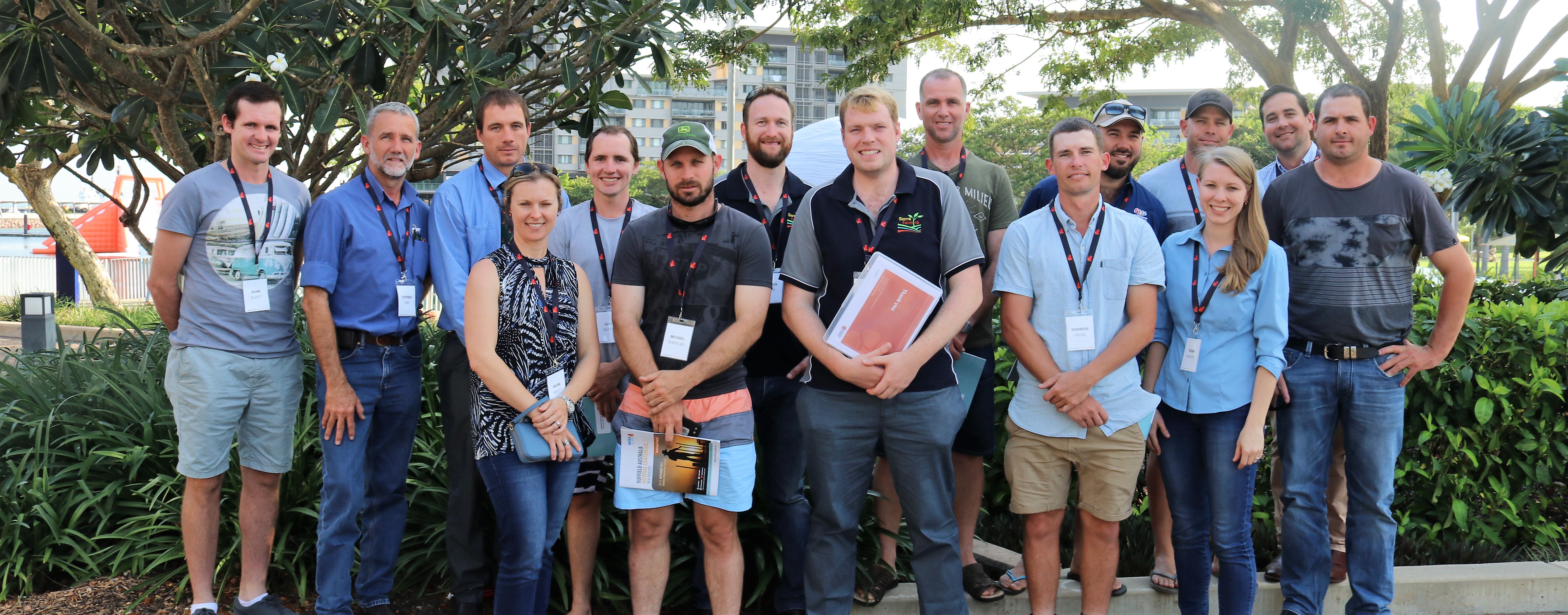In October, a group of enthusiastic, young growers took part in a two-day visit to the Northern Territory, as part of a fact-finding Next Gen tour. The tour included a visit to a Panama TR4 trial site and the opportunity to network at the Nuffield Australia National Conference in Darwin.

By Tegan Kukulies
Thirteen young banana growers from the NextGen group participated in a study tour to the Northern Territory.
The two-day trip covered three key activities, starting with a visit to the variety screening and development trials at the Coastal Plains Research Station.
This was followed by a visit to one of the only remaining commercial banana farms in the NT growing Williams Cavendish.
On the second day, growers took the opportunity to attend the 2017 Nuffield Australia conference.
At the Coastal Plains Research Station, growers saw two variety initiatives that are underway aiming to develop a panama resistant variety.
The first initiative is a trial consisting of 27 varieties, predominantly from international breeding efforts which are being screened for Panama disease tropical race 4 resistance.
The second newer initiative, includes nearly 800 GCTCV 119 plants which have undergone mutagenesis, a process which essentially generates greater off-type variation in the tissue culture process in an aim to develop an off-type resistant to panama disease.
There was lots of discussion about the variety screening trial as growers were able to see how the varieties were performing.
Adam Gilbert, a grower with family-owned properties on the Atherton Tablelands and in Tully, said his first impression of the Williams was “heart-breaking”.
“To see such a productive plant and to see that they aren’t going to stand up to TR4. They may stand up for 12 months, but after a couple of ratoons they are going to be all dead!” he said.
Peter Inderbitzin, a grower at Lakeland commented on the different Cavendish lines.
“It was interesting to see the variation in the different Cavendish lines. I was impressed with Formosana and CJ19 and I think they are two options which could be explored further.”
Innisfail grower Kris Horsford added, “It was interesting to see many of the FHIA lines surviving under high disease pressure. These aren’t Cavendish lines, so I’m not sure what the future of them would be commercially, but some appear to be producing decent bunches”.
The second stop was to the Darwin Fruit Farm which has a long history of panama disease and is one of the only remaining farms in the area growing Williams in the presence of the disease.
“It was a valuable experience to see a commercial farm growing Williams in the presence of TR4. We saw what was honestly one of the best plant blocks I have seen and you didn’t have to look too far to find plants with symptoms of TR4,” Luke Gilbert commented.
Farm manager Mark Smith and the team at LaManna Premier Group generously gave their time by sharing their experiences of commercial banana production in the presence of TR4.
The group gained great value out of the visit and were sincerely thankful to Mark and the LaManna team for their contribution.
The trip coincided with the 2017 Nuffield Australia National Conference held in Darwin.
Presenting at the conference was the banana industry’s 2016 Nuffield scholar Matthew Abbott.
Matthew, who is also a NextGen member, presented findings from his Nuffield study that focussed on opportunities for organic banana production, particularly sustainable practices in Australia.
Innisfail grower Gavin Devaney said attending the conference was extremely valuable.
“We heard from a large range of people from different industries and it didn’t take long to appreciate that all agricultural industries have very similar issues and therefore a lot of knowledge and learnings can be drawn from these other industries,” he said. “Listening to other grower’s talk first-hand about their experiences was a real highlight.”
The group was very conscious of the biosecurity risks associated with visiting the NT and followed stringent procedures. Personal items and bags were not taken into the field and shoes, clothes and hats worn in the field were disposed of in the NT and phones were sanitised.
